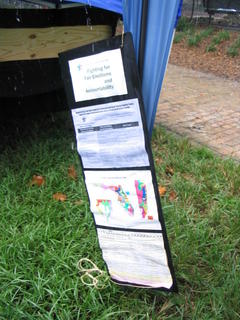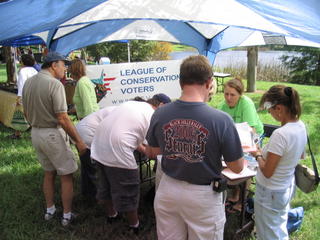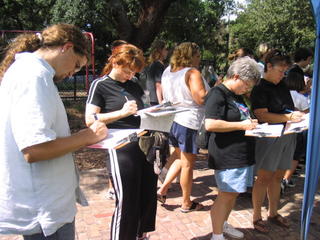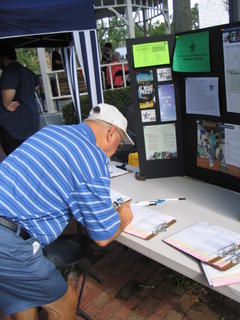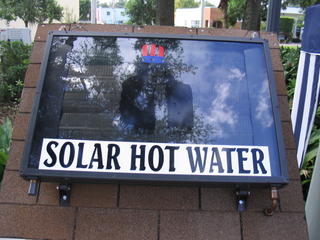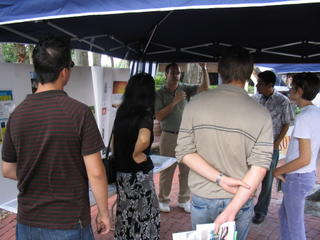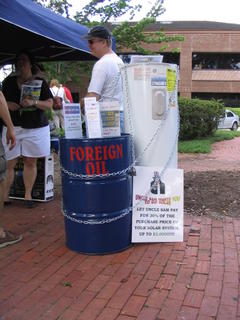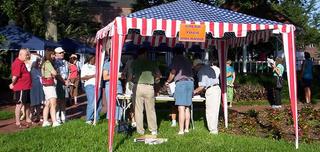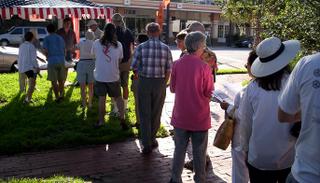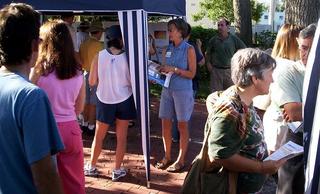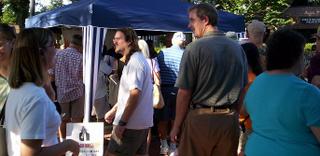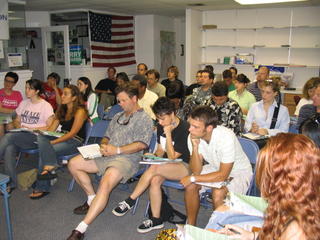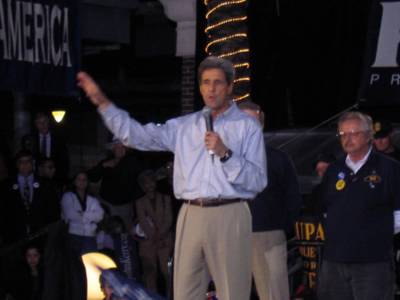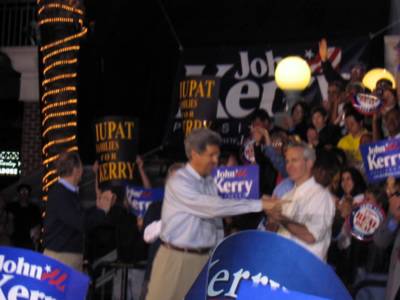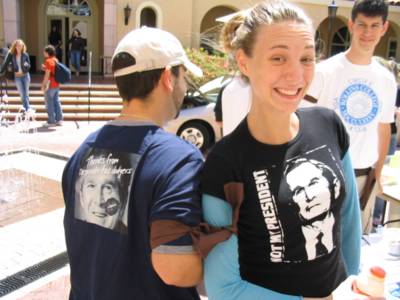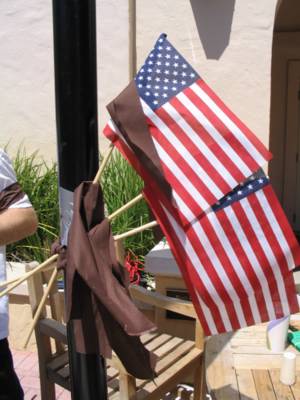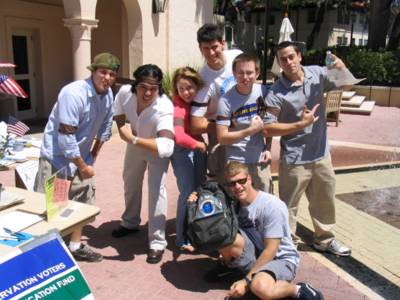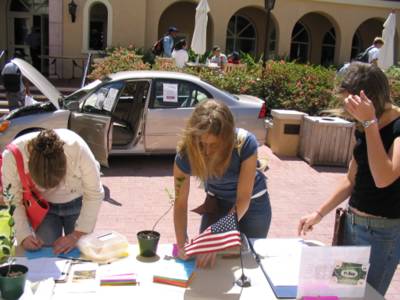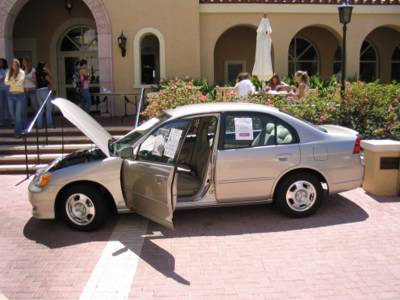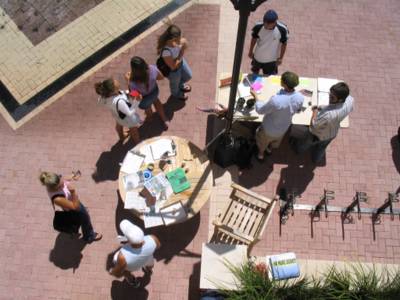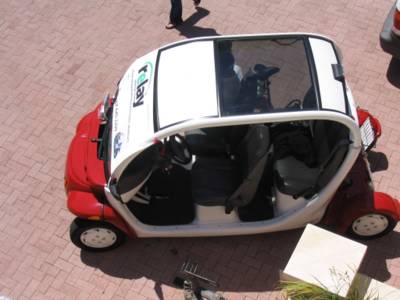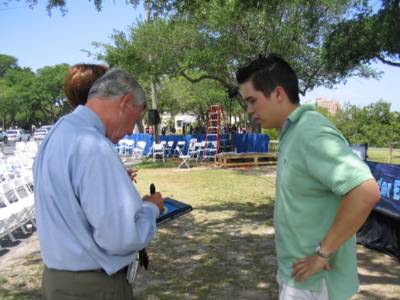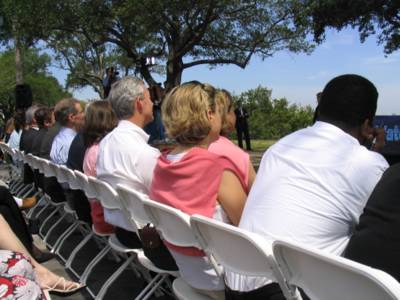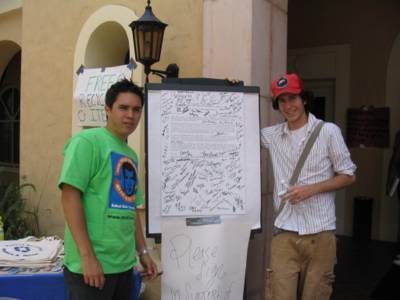http://www.orlandosentinel.com/news/local/orange/orl-solartour2505sep25,0,7920972.story
Article published September 25, 2005
Homeowners step into spotlight to extol virtues of sunlight A tour of 3 homes and a school on Saturdayjoins a nationwide drive to spread the word.Peggy Musial Sentinel Staff Writer
Posted September 25, 2005Looks can be deceiving, as New York transplant Andrew Brown discovered when buying his first home last September.
That's not necessarily a bad thing.
He loved the architectural design and open floor plan. The 1,922-square-foot, two-story home was bigger than nearby properties, but it didn't stick out as being unusual.
Digging deeper, he discovered this property was the "Orlando House," built in 2002 by the city as a demonstration home to meet strict energy-efficiency standards and green-building guidelines. Another plus, he thought.
He bought the house mostly because of the downtown location and aesthetics. Yet, a year later, the benefits of choosing this particular home keep adding up.
"Living in this home, I'm absolutely aware of what I'm doing," he says, and not just because he's paying the electric bills -- which average what he paid for an 800-square-foot apartment.
"I really try to conserve water, recycle what I can -- for everybody's sake. This is a home for Florida's future."
On Saturday, he's opening his doors to spread the word about energy conservation and eco-minded living as Orlando for the first time partners with communities in more than 40 states for the 10th annual National Solar Tour. Across the nation, communities, schools and residents are staging events simultaneously to bring home the idea that solar energy is a viable, nonpolluting and cost-saving alternative to fossil fuels.
The Solar Tour Orlando venue, presented by the Central Florida Renewable Energy Society, begins at 9 a.m. at Albert Park on Edgewater Drive in College Park, followed by a self-paced driving tour to three local solar-savvy homes and to Edgewater High School, which uses solar electric panels.
At the fair, visitors can learn about the science and politics of solar technology in general. More specifically, visitors can walk away from the tour knowing the difference and benefits of solar electric power -- or photovoltaics -- and solar thermal power, which is used to heat water, says event organizer Craig Williams. The potential to generate solar power in Florida is tremendous, he says.
"What better way to promote living in the Sunshine State?" Williams asks.
Raising public awareness -- about solar energy, political advocacy and alternative energy sources -- is what the fair and tour are all about, says Williams.
"Sunshine is Florida's most abundant natural resource. It's there for all of us."
Presenters from the energy society will talk about solar electric rooftop systems. Visitors also will learn how to take advantage of the new federal 30 percent solar tax credit of up to $2,000 for using solar thermal and solar electric systems, Williams says.
David Bessette of Allsolar Service Co. Inc. in Orlando will have a miniature solar hot water system and solar electric system on display to show the components and demonstrate how these systems connect to a home. Consultants also will talk about how a solar hot water system can save upwards of 25 percent on each electric bill and pay for itself in less than five years.
Members of the Central Florida Sierra Club will be on hand to emphasize the importance of renewable energy for the environment, the economy and national security.
Also, energy advocates from the League of Conservation Voters will talk about public policy."With the right kind of public policy for rebates and incentives, this [solar] technology has been proven to thrive in other states, and it most certainly should be a major part of any energy plan for Florida," Williams says.
Then, at 10 a.m. the road tour begins.
Setting an example
If the sun's out, tour-goers can watch electric meters spin backward at two of the downtown residences -- an energy-efficiency option that puts money back in the homeowner's pockets. Excess solar-generated electricity collected from these systems flows into the Orlando Utility Commission's grid, adding to the utility's reserve.
One homeowner on the tour, Dr. Robert Stonerock, built his Lancaster Park home in 1996 using two solar thermal systems to heat water and one solar photovoltaic system to run ceiling fans and lights on one side of the house.
In 2001, he installed a second solar electric system, taking advantage of the Florida Solar Energy Center Rebate program, which connected this system to the OUC grid and nets him a $50 credit each month on his electric bill.
Stonerock expects people will ask him if the $60,000 solar system is worth the investment. Absolutely, he'll say. He uses 25 percent less grid electricity with solar equipment, he says, although the reason he chose solar power isn't based entirely on economics. In fact, he says, the economic return for using solar electricity today isn't competitive with using fossil fuels, although it is getting better.
Solar hot water savings, on the other hand, are competitive in today's market, he says.
"I could have bought a Lexus for enjoyment, but instead I bought a solar system because it's the right thing to do. I wanted to set an example for others," he says.
Another benefit presented itself during last year's barrage of three hurricanes: Stonerock was able to run most appliances in his home and take hot showers while his neighbors waited out the power outages.
At Brown's home, Joe Sandley, project manager for the Orlando House, will explain how the home was designed to meet strict energy-saving standards, including sustainability, energy efficiency, use of recycled materials, affordability and environmental friendliness.
Brown's home is equipped with a solar water-heating unit. Visitors also can glimpse other energy-efficient aspects of the home, such as the metal roof, termite-resistant bamboo flooring and the Energy Star appliances and windows.
The home, which was constructed on an infill site, also was intentionally built to show that traditional design and environmentally-minded construction materials can blend seamlessly in a residential neighborhood. The home received Energy Star and Florida Green Building Coalition certifications as well as the Gold Ring Rating set by OUC for energy efficiency.
The downtown road tour should take from two to three hours, Williams estimates, depending on how long visitors stay at each home.
Carpooling, which just about goes without saying, is encouraged.
Copyright 2005,
Orlando Sentinel Get home delivery - up to 50% off



